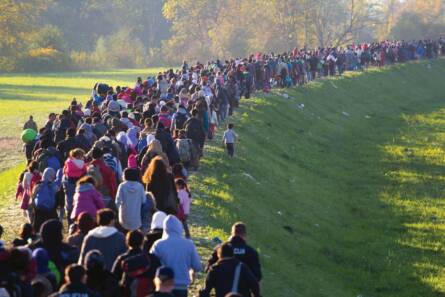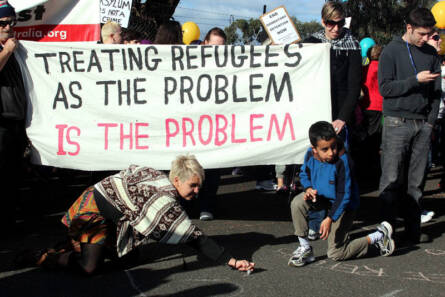Disclaimer*: The articles shared under 'Your Voice' section are sent to us by contributors and we neither confirm nor deny the authenticity of any facts stated below. Parhlo will not be liable for any false, inaccurate, inappropriate or incomplete information presented on the website. Read our disclaimer.
This article was originally submitted by Maryam Ijaz
Human Flow, a documentary; by Ai Weiwei, is a striking depiction of the shocking plight of migrants; in search of a safe place that they can call home. The title itself says a lot, it calls human flow, emphasizing on the aspect of humanity.

It’s not about the people of a certain country, religion or ethnicity, it’s about us; the humans and we have to identify with them on humanitarian grounds. It’s about human rights, which needs to be protected without any excuse. Human flow has documented the harrowing extent of massive global displacement with great compassion and honesty. More than 65 million people worldwide are being forcibly displaced; due to either climate change, conflict or wars, making it the largest refugee crisis since the Second World War.
Ai Weiwei has cited multiple causes behind this migration crisis; including the Syrian conflict, the Arab-Israeli wars that led the formulation; of the world’s largest Palestinians refugee population, Iraqi invasion by the U.S, Ethnic cleansing of Rohingya Muslims. Robbed of their international rights, many of these refugees clearly were self-sufficient people; who were forced to migrate from their country due to conflict and war.
Human Flow exposes the raw reality of the people, labelled as migrants.

People that we all must have had watched or read about in the news, carrying their whole life savings; in plastic bags, making perilous journeys and putting everything on risk to find a better way of life. This is not just a national issue that we can ignore, it’s a global issue. And we all are collectively responsible for playing our parts for eradication this problem.
It gives a vivid vision to the audience of the extreme difficulties the migrants are facing; how an exhausted group of refugees, after landing in Greece, walk all the way only to find themselves stranded; by the barbed wire fence on the Macedonian border. Living in rain-soaked tent camps between railways; with passing Greek trains and sounding their horns constantly, the heart-wrenching interaction between displaced brothers; whose faces were enshrouded in shadow, the shattered man; recounting the drowned members of his family, the closure of borders; depicting the changing shade of humanity and the children; starring at the lens with the appeal for recognition was heart-breaking.
“Don’t send us back to hell,” one woman says. One boy hid his face behind a sign that read “RESPECT” while the protesters; around him, chanted “Am I Not Human Too?”

It’s very natural to hide and cover your face; when you are suffering but feeling ashamed to suffer is inherently wrong.
One shouldn’t be ashamed in being the victim; having things taken from you by another entity in the form; of foreign invasion, conflict, war or by your own state in the form of ethnic cleansing; or by some man-made or natural disasters, in the form of global warming. It’s the abuser to be ashamed of, the society that allows that injustice, not the victim.
This documentary is all about those who been forgotten by the ones having the capacity to make a difference. When Jordan can host two million Palestinians and their descendants; during wars of 1948 and 1967 (Koser and Wilkinson, 2007), in addition to the new 1.4 million refugees; from Syria, Lebanon can take in 2 million; of Syrian refugees, approximately a third; of the total country’s population (Spencer, 2017) and when Pakistan can host; three million Afghans displaced (Geiger and Pecoud, 2010), why can’t the other developed countries; from the NORTH do the same and accept as many as millions of refugees into their own countries?

Do we see any ray of hope in this heart-wrenching collection of stories? Yes. We, irrespective of our colour, creed, culture, nationality or religion, collectively can help; in eradicating this problem and helping those who are suffering right now.
It is impressive how these immigrants adamantly refuse any idea of going back home; even when they are being rejected by different countries, facing harsh conditions and are stuck in limbo.
But they have not lost their hopes, and in their hopes lies our strength.

It’s time for us to acknowledge them as humans who deserve identity, home and happiness; who should not live to survive but live to dream. In the present status quo, when there is so much uncertainty in the whole global world; on the issue of migration and immigrant rights, this documentary can definitely help in waking up our dead – sleeping souls.
“The more immune you are to people’s suffering, that’s very dangerous. It’s critical for us to maintain this humanity.” says Princess Dana Firas of Jordan in Human Flow.







